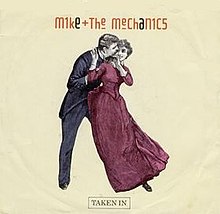Taken In
| "Taken In" | ||||
|---|---|---|---|---|
 | ||||
| Single by Mike + The Mechanics | ||||
| from the album Mike + The Mechanics | ||||
| Released | 30 June 1986 | |||
| Recorded | 1985–1986 | |||
| Genre | Soft rock[1] | |||
| Length | 4:17 | |||
| Label | Atlantic – Atlantic 89404 | |||
| Songwriter(s) | Mike Rutherford, Christopher Neil | |||
| Producer(s) | Christopher Neil | |||
| Mike + The Mechanics singles chronology | ||||
| ||||
"Taken In" is a song performed by Mike + The Mechanics. Written by guitarist Mike Rutherford and producer Christopher Neil, it was the third single released in June 1986 from their 1985 self-titled debut album, and the third to become a Top 40 hit on the Billboard Hot 100 chart.[2]
Composition
As with all the songs on Mike + The Mechanics, "Taken In" began life as a bit of material on a set of demo tapes that Mike Rutherford showed to producer Christopher Neil. According to Rutherford, this particular fragment "has to be the tiniest bit you've ever heard on my tape... If you closed your eyes, you missed it. And Chris [Neil] picked it out, again, and said 'You work on that.'"[3]
Details
"Taken In", like the preceding single "All I Need Is a Miracle", features lead vocals by former Sad Café vocalist Paul Young.[4] It reached number 32 on the Billboard Hot 100 in August 1986; it was the band's last US Top 40 appearance until 1989's "The Living Years".[2]
The lyric "There's one born every minute, and you're looking at him" is a reference to the popular expression "There's a sucker born every minute."
Reception
Cash Box said that it "taps a smooth, synth/ sax approach; sultry summer sound with a fool-for-love theme."[5] Billboard called it a "mild, swaying mood piece."[6]
Music video
The video for the song opens with Mike Rutherford placing a collect call to a fictional tour manager for the band (played by Roy Kinnear, in a reprise of his role from "All I Need Is a Miracle"). The manager acts suspicious, initially pretending to be absent, and is visibly relieved when Rutherford tells him that due to trouble with the tour van, the band has not yet reached the lodgings that the manager booked for them. After the van is repaired, the band reaches the house and sets up for some rehearsal before bed. The reason behind the manager's odd behavior then becomes apparent: he has accidentally double-booked the house to a family with a half dozen children, who are awakened by the band's performance. The mother is confused and upset by the band's presence, but the father (played by actor/comedian Richard Belzer), seeing that the children are enjoying the music, suggests that they let the band finish the song and then sort things out. Afterwards, Rutherford apologizes to the father and appeals to him to let them stay. He readily agrees since the children all like the band members, and they all spend the next day at the beach. The band then heads back on tour, but the van breaks down again. In an apparent play on the band's name, they try to fix it themselves, but the same family drives by and gives them a lift. As they drive off, all the band's equipment piled up on the car's roof, the father comments that they seem poorly managed and offers to be their new manager.
The role of bassist in the video was played by Paul Young's former bandmate Ashley Mulford. Mulford did not play on any of Mike + The Mechanics's actual sound recordings, but was part of their real life touring band for a time.
Chart performance
| Chart (1986) | Peak position |
|---|---|
| Canadian RPM Top Singles | 39 |
| U.S. Billboard Adult Contemporary.[7] | 7 |
| U.S. Billboard Hot 100 | 32 |
References
- ^ "Not Fade Away: Re-evaluating Genesis' 'Invisible Touch' 30 Years Later".
- ^ a b Whitburn, Joel (2004). The Billboard Book of Top 40 Hits (8th ed.). Billboard Books. p. 425. ISBN 0-8230-7499-4.
- ^ Neer, Dan (1985). Mike on Mike [interview LP], Atlantic Recording Corporation.
- ^ Mike + The Mechanics (Media notes). Mike + The Mechanics. 1985.
{{cite AV media notes}}: CS1 maint: others in cite AV media (notes) (link) - ^ "Single Releases" (PDF). Cash Box. 21 June 1986. p. 11. Retrieved 4 August 2022.
- ^ "Reviews". Billboard. 21 June 1986. p. 73. Retrieved 4 August 2022.
- ^ Whitburn, Joel (2002). Top Adult Contemporary: 1961-2001. Record Research. p. 170.
